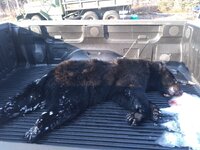Correct.You have about the best hunting dialing scope around, however you choose not to dial……
If it’s only a couple mills, I would just use the holdovers in the reticle.
That’s faster and simpler.
At least, that’s the idea.
Follow along with the video below to see how to install our site as a web app on your home screen.
Note: This feature may not be available in some browsers.
Correct.You have about the best hunting dialing scope around, however you choose not to dial……
I am familiar with “Kentucky windage” but that’s not relevant to the topic being discussed here.And a great reticle for holdovers, yet he wants to play Kentucky windage (
Nothing!I like my clicky scopes. What’s wrong with dialing?
So you just are going to holding using MILs on the reticle instead of dialing to 650yds then dial from there?Nothing!
However, holding stadia in the reticle is quicker. Usually limited to shorter ranges though.
I’m working out how far that range can reliably be pushed.
Also, I leave the SWFA capped. Less chance for the turret to get bumped.
Have you ever shot far enough to need a calculator or is this all theoretical?I started playing with the ballistics in my calculator
Why wouldn’t someone simply hold a hand width low at 100 and 200 yards? A 300 yard zero doesn’t mean someone has to hold in the middle and hope for the best. A hand width gets the point of aim within an inch and everyone has a ruler on the end of their arms to judge what a hand width is so it’s not difficult.Even within this idea, the 300 yard zero doesn't make sense. With a 100 yard zero, aiming high lungs is in the vitals to 300 anyway even without dialing or holding over.
You still have to hold over at 350+ so why worry about holding under from 0-300 (where probably 90% of your shots will be) just to save .5 mil at 450?
Why is holding a hand low from 0-250 better than holding a hand high from 250-300?Why wouldn’t someone simply hold a hand width low at 100 and 200 yards? A 300 yard zero doesn’t mean someone has to hold in the middle and hope for the best. A hand width gets the point of aim within an inch and everyone has a ruler on the end of their arms to judge what a hand width is so it’s not difficult.
In one afternoon it’s easy enough to teach a teenager to ring 10” plates from 100 to 400 yards with a 300 yard zero, and for adults it’s definitely the fastest way to ring all four plates as fast as the bolt can be worked.Why is holding a hand low from 0-250 better than holding a hand high from 250-300?
That's why I said 3" high at 100 POI in my post. I lost track of the # of aoudad an deer I killed like that before rangefinders existed.In one afternoon it’s easy enough to teach a teenager to ring 10” plates from 100 to 400 yards with a 300 yard zero, and for adults it’s definitely the fastest way to ring all four plates as fast as the bolt can be worked.
Not to be a nit picker, but if you hold a hand width high with a 100 yard zero in the 7 mag it misses a 300 yard 10” vital zone completely. It also takes away the ability to easily judge 350 and 400 yard holds. With a 300 yard zero 350 is hand width high and 400 is either on he back of a mule deer or two hand widths high. Easy peazy.
Not to be a nit picker, but if you hold a hand width high with a 100 yard zero in the 7 mag it misses a 300 yard 10” vital zone completely.
You’re right. 3” low, but definitely in there close enough.This thread is about a 150 eldx at 3300 fps, not a 150 psp at 2950. Holding a half mil ("a hand") at 300 is well within the vitals with that load.
Correct.
If it’s only a couple mills, I would just use the holdovers in the reticle.
That’s faster and simpler.
At least, that’s the idea.
The advantage I see is that for shooting without dialing, a 300 yard zero keeps the bullet in vitals much further out than a 100 yard zero.Why is holding a hand low from 0-250 better than holding a hand high from 250-300?
The advantage I see is that for shooting without dialing, a 300 yard zero keeps the bullet in vitals much further out than a 100 yard zero.
With a 100 yard zero, the bullet drops out of the vital zone much closer in and very quickly requires more than just a "hand width" of estimation.
I've used a 3" high @ 100 (280 yard zero) on my 308s and 30-06s for years. I have reticle dots for further shots, if needed, but for me, they very rarely are.
I guess I should add for the OP, I don't think what I'm doing for 0 - 325 or so yards is practical much further out. Reticle dots or hash marks you're pre-familiar with would be needed further out if you're not dialing, but I think that's what you're saying.
Yeah. Definitely helps to be mindful of a lower hold in the 100 - 225 or so range, although I haven't been enough times to know that works too.Theoretically in the vitals but if holding dead on in the more common 1-200 yard shots if you hold directly on desired POI the POA is already at edge of vitals on deer sized game. If the load in the OP's case would be 3" high @100 he'd be over 4" off at one point before getting to zero.

